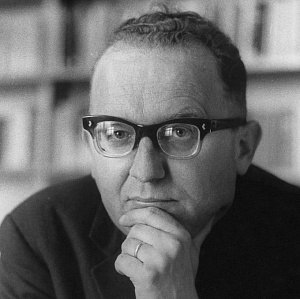
VIKTOR KALABIS
A CENTENARY OF BIRTH


Viktor Kalabis, one of the most significant Czech composers of the 20th century and husband of the harpsichordist Zuzana Růžičková, was born 100 years ago, on 27th February 1923 in Červený Kostelec, and died on 28th September 2006 in Prague.
Kalabis began playing piano in public at the age of six, and he later worked as a choirmaster, but he also played saxophone. In those days, he was living in southern Bohemia. Soon after finishing secondary school near the end of the Second World War, he was forced into slave labour for the Third Reich, and he was only able to begin his musical studies in Prague after the war’s end. He attended the Prague Conservatoire and then the Academy of Performing Arts, but he also studied musicology and psychology at the Charles University Faculty of Arts.
Kalabis did not join the Communist Party, and he was not a composer favoured by the regime. Nonetheless, he had significant influence on Czech musical culture both as a composer and as an organiser of cultural events. Besides composing, he devoted his energies to Czechoslovak Radio broadcasts for children and young people. He was deeply shaken by the Soviet occupation in 1968, and this was also reflected by the defiant expression of his music. After 1970, during the era of “Normalisation”, Kalabis no longer worked in radio, and he began devoting himself exclusively to composing and to creative contacts with the performers of his works. After 1990 he was able to travel more, and he was in attendance more frequently at performances of his compositions around the world.
He largely composed instrumental music, including works for his wife, the internationally famed harpsichordist and teacher Zuzana Růžičková (1927–2017), who radiated a persuasive love for his music to the very end of her life.
After the releasing of a three-disc album of symphonies and instrumental concertos (SU4109-2), the Supraphon label decided to survey Kalabis’s piano music, and engaged the pianist Ivo Kahánek for the task (SU4259-2). The album was preceded by a recording of three sonatas in which the pianist successively partnered with cello, clarinet, and violin (SU4210-2).